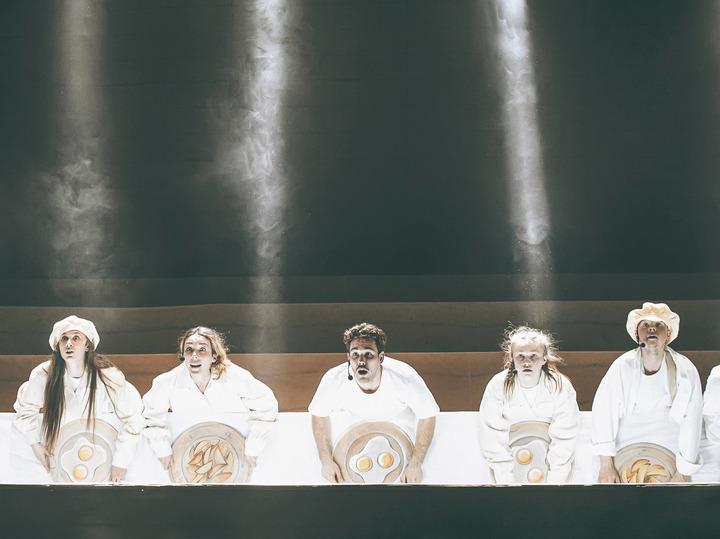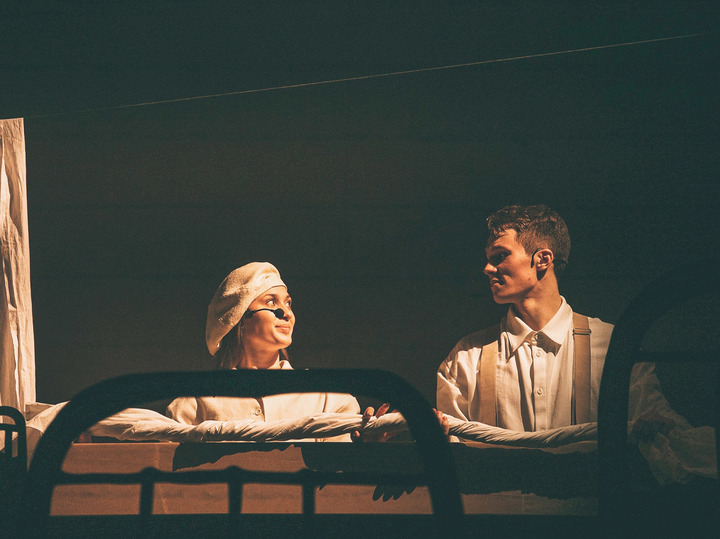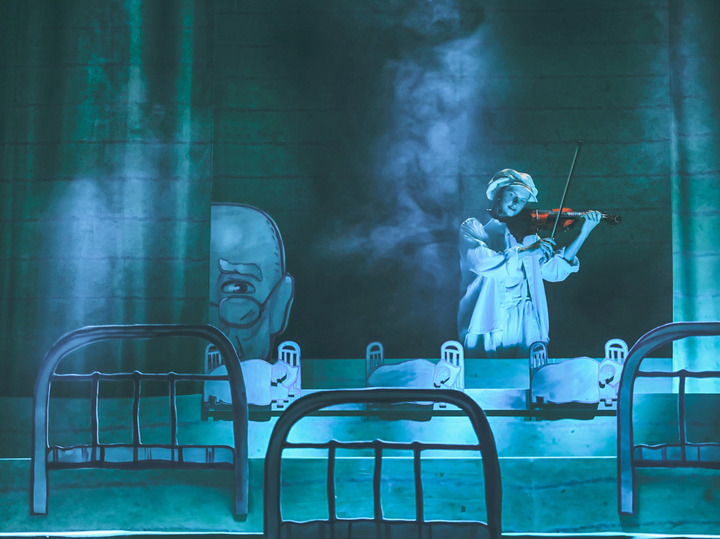Three hundred dolls were made for the play about Korczak.
[ad_1]
In Ryazan, despite the heavy rain, they are in full swing preparing to lay out the red carpet at the local drama theater. Today the results of the “Mirror of the Stage” festival, the ninth in a row, will be announced here. But it is already clear that the leader in the number of prizes may be the Ryazan Puppet Theater, well known not only in Russia. In any case, one of his three performances shown as part of the festival made audiences of all ages cry and not hide their tears. About 300 dolls were made for him.
“A Summer to Remember” is the name of the play dedicated to Janusz Korczak, who, together with a group of his students, stepped into the gas chamber in the Nazi concentration camp Treblinka 2 in August 1942. Although he had a choice – to stay in Warsaw or go there with his children. He preferred the latter and, once in the camp, took the two smallest children in his arms and walked with them in front of the column doomed to death. “Children have the right to die,” the final handwritten title appears as the curtain slowly descends.
I went to the play about the teacher and humanist Korczak not without fears – a difficult topic, which they prefer not to upset modern children, who are focused on receiving pleasure and joy from life, and not negativity. Even in times of military conflicts multiplying across the earth. But the play about Korczak, composed by the young director Anna Koonen and her talented team, is filled with joy. How filled the summer is, left to us as a memory from childhood.

That Warsaw summer of 1939 for Mr. Dr. Goldsmith, now known to the world as Janusz Korczak, and the poor Jewish children he collected in pre-war Warsaw, begins at the station. In the space of the stage it is indicated only by two large iron wheels and a piece of railroad tracks. And also the sounds of the bustle of the station – the conductor’s whistles, the nervous voices of those departing/seeing off. Flat figures of children and mentors of pastel color, as if drawn by an inept child’s hand and collected in groups, are loaded into carriages, which are also not visible, but from the cues it is already clear who is who and where they are going – to a summer camp in Mikhailovka to drink milk and bread , which many of the children did not have, and to learn self-respect, justice, and to be decent people in the Children’s Republic of Mr. Doctor. “Children have the right to be themselves,” “Children have the right to play,” “Children have the right to respect and love.” “The loneliness of a child gives the doll a soul,” is not pronounced, but is written on the backdrop, and this is, perhaps, the only fragment of the pedagogical ideas and experience of Mr. Doctor, which subsequently influenced world pedagogy. His Orphanage in Warsaw, his summer camps in Mikhailovka and other places for Jewish children. And here he is – like a doll, big and small, and like the actor Vasily Utochkin.
“But what is it like to imagine that you are a Jewish boy or girl from a poor family in pre-war Warsaw? — writes anthropologist Marsha Talmadge, a researcher of Korczak’s life and works. – At home you live from hand to mouth and you have to steal food or work hard to at least sometimes feel full. You don’t know what it’s like to sleep in your own bed (you sleep in the same bed with your brothers and sisters – what a child’s bed, what are you talking about?). You don’t know what it’s like to wash every day, wear clean clothes, or go to school. You often don’t know what a respectful conversation between an adult and you is, even if not on equal terms, but at least without insults.”
Such children were collected throughout Warsaw and warmed by the altruist Korczak. But on stage there is joy. Discovery of the world, of oneself. The funny, pigtailed Blyumka (Daria Efremova) keeps a diary, describing camp life day after day, and the puppet theater presents this children’s world on four lifting platforms that occupy the entire stage from portal to portal. How the pupils went for a swim, how Rivka, who constantly coughs and, due to illness, does not participate in children’s pranks, reads books and tells everyone fairy tales about birds and angels who swallowed tiny diamonds and therefore began to sing divinely… How their children’s court, established by Mr. Doctor, tried the case three boys who were at first gloomy and embittered (from extreme poverty), and then, from a kind attitude towards them, became completely different. And one of them, the most difficult one, then lay there at night and cried silently while everyone around him slept.

The world of the children’s republic, invented and embodied by Mr. Korczak, was built by Anna Koonen’s team with unusual subtlety – it is simple and at the same time metaphorical. The dolls are flat, on sticks (professionals call this on pogoki), masks—there are about three hundred of them in total—were invented by the artist Alexandra Gromova. It’s as if they were drawn by a child’s hand – that’s why they are charmingly irregular, small and human-sized, funny. Planar and in the form of masks on the faces of actors. Yes, there are nearly three hundred puppet figures of different sizes, and there are only nine actors working with them, and one can only be amazed and admire with what dexterity they manage to cross, run across, or simply dive openly like a fish from one level to another. Puppeteers are like acrobats here – otherwise you won’t have time to change the puppet or get into a new mise-en-scène. But the troupe at the Ryazan Theater is excellent, capable, it seems, of the impossible.
Koonen’s childhood life, in contrast to adult life, is full of summer adventures, discoveries and joy, as if the year was not 1939 and there were no traces of the German soldiers who started the Second World War with the capture of Poland. But the performance is structured in such a way that at first timid, and then more and more often emerging metaphors will indicate the inhuman horror that awaits Poland, and Europe, and the children of Mr. Doctor himself. A star will flash in the sky, but it will be a six-pointed one, with which they will then shamefully seal the entire Jewish population, sending them to the ghetto. The train leaving for the summer camp will initially make you shudder – after all, upon returning to Warsaw, Rivka, Blyumka, little Abramchik and the rest of the guys will be loaded onto the train to be sent to the death camp. Children have the right to die…
And the music, written by Artem Tulchinsky, is a constant background – sounds, melody, quotes from Kleizmer music and even the Beatles (a fragment from their “Yellow Submarine”). And the nature of the music itself, which accompanies the carefree summer narrative, is somehow disturbing from the very beginning. Moreover, it disturbs delicately, quietly, but persistently it confuses the soul.
And the outline of angelic wings, and thin spikelets in the wind, and the shadow of the violinist, and then he himself, appearing at the upper, fourth level of the rise, carry the tremulous emotion of a child’s life, namely a child who, according to Korczak, “is like spring. Then the sun will come out – and then it will be clear and very cheerful and beautiful. Then suddenly there is a thunderstorm – lightning flashes and thunder strikes. And adults seem to always be in a fog. A dreary fog surrounds them. No great joys, no great sorrows. Everything is somehow gray and serious. Because I remember. Our joy and melancholy come like a hurricane, but theirs can barely follow.”

In the finale, two locomotive wheels will not go to another camp. In the last scene, happy children, rested, wiser and well-fed, are preparing to return to Warsaw. Warm light (artist Yuri Lebedev) floods their joy. I just want to shout to them: “Stay in this Mikhailovka, don’t come back.” But the curtain falls, and lines run across it in silence in neat handwriting: “In August 1942, Mr. Doctor, together with his children, entered the gas chamber.” Such silence is like a guillotine.
[ad_2]
Source link






